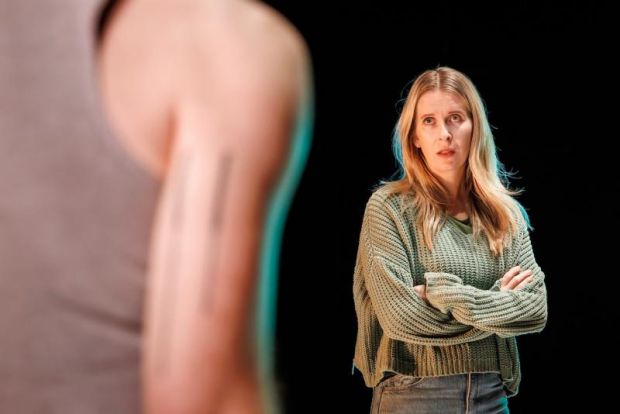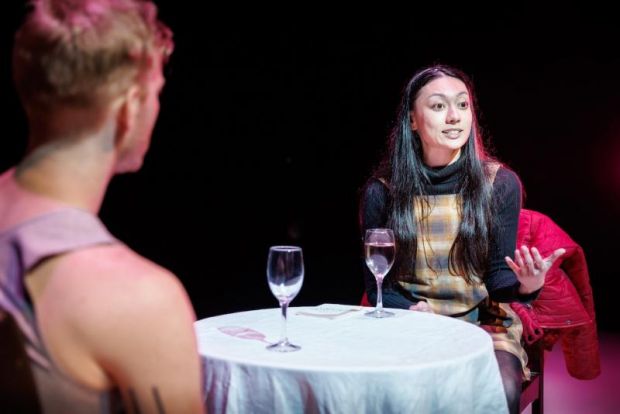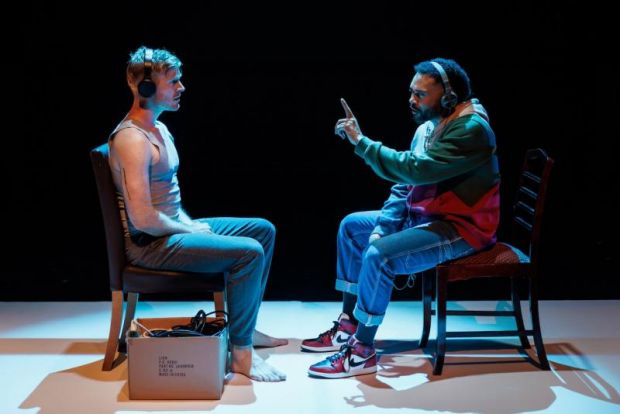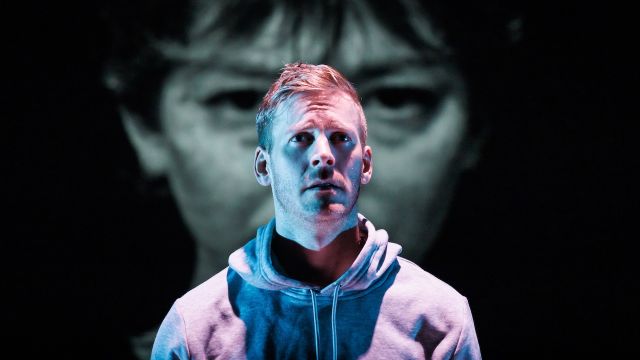Duck Duck Goose
In Duck Duck Goose, the victim of a rape, and the accuser, Jane (Rachel Nutchey) appears on stage only for a few minutes, just enough for us to know who she is. She is not the subject; she is a functional character; but she is a fact; her rape is a fact. And in this play, that’s the catalyst for what Caitríona Daly wishes to reveal: complicity.
Duck Duck Goose is a discomfiting tale in which every painfully truthful scene puts the central character on the spot and makes him – and us – awkward and even guilty. It is the sadly familiar story of the aftermath of a rape, but it avoids the usual patterns and tropes, and reveals instead the ripples and repercussions, the moral murk that can last years and years afterwards. It gives a different perspective on ‘rape culture’. It says we should believe what we know perfectly well almost certainly occurred. But instead, especially if we are men, we’ll close ranks, we’ll be loyal, we’ll shift blame, we’ll invent motives, we’ll fall back on the usual evasions, and we may even find ourselves making excuses and protestations of our own innocence.

We don’t even see Jane when, years later as these things play out, the crime goes to trial. We don’t need to see Jane – and we know what’ll happen in the courtroom…
Daly’s play achieves its forensic examination by telling the tale not from Jane’s point of view, but from the point of view of Chris (Mitchell Holland) an ‘ordinary bloke’, pulled into circumstances that he desperately hopes he could have avoided. It’s Chris’ story, but he doesn’t drive the action. He’s a well-meaning spectator, the best friend of the accused rapist, Davey (Matt Domingo) – who couldn’t possibly have done that, could he? Daly dramatises key encounters of the aftermath – an angry misogynist, an opportunist shock jock, the friend who goes too far (all three played by Ilai Swindells).

There’s something sickeningly predictable about those encounters – which does not make them any the less true. But it is the women characters who illuminate the issues here. Chris’ ‘reasonable’ sister Sarah (Emily Carr) is inclined to go along with the blokes as many women will do and make the same excuses – but we see where that takes her. The key encounter is between Chris and Marie (Jeanda St James) where, in a vivid, sustained monologue, she forces him to see the truth – not of Jane’s rape, but of the culture that looks the other way.
Successive scenes play out under Arielle Roberts’ glaring white no escape lighting, on Mikailah Looker’s narrow strip of white stage where all scenes play out with minimal blackouts between them.

Given the quality and the insight of Daly’s writing it is unfortunate that elements of this production create barriers between audience and text. While experienced director Timothy Wynn achieves nuanced subtlety in some of the performances – notably Mitchell Holland’s recessive Chris, Emily Carr’s Sarah, and Jeanda St James’ cool objectivity – there’s a tendency to play confrontations in static profiles that exclude us.
Perhaps more important is the decision to maintain the Irish accents of the play’s origins – that is, Galway in the west of Ireland. Given that the story is universal, this purist approach seems like a step too far. Couldn’t the cast suggest the Galway accents but still be comprehensible? (As is the practice with American or regional British plays.)

A dialect coach, Michael Mandalios, is credited, but in a sense, he has done his job too well: a great deal of the dialogue (all of it of course crucial) is impenetrable. At least one of the actors seems to’ve been quite overwhelmed by the Irish accent thing and compounds the difficulty by speaking very fast and very loudly. One can scarcely understand a single word across the entire play.
Perhaps aware of this problem – although determined to persist with it – there are surtitles projected on the rear wall – white on black. This is helpful except that the text size is too small, badly illuminated, jumps about in a way that does not follow what is being said, and is sometimes hidden anyway behind the canopy above the stage.

What a pity that this revealing, courageous text – that displays such insight into a kind of masculinity and those that go along with it – and with fine performances - is hindered in its communication by decisions that get in the way.
Michael Brindley
Photographer: Darren Gill
Subscribe to our E-Newsletter, buy our latest print edition or find a Performing Arts book at Book Nook.

